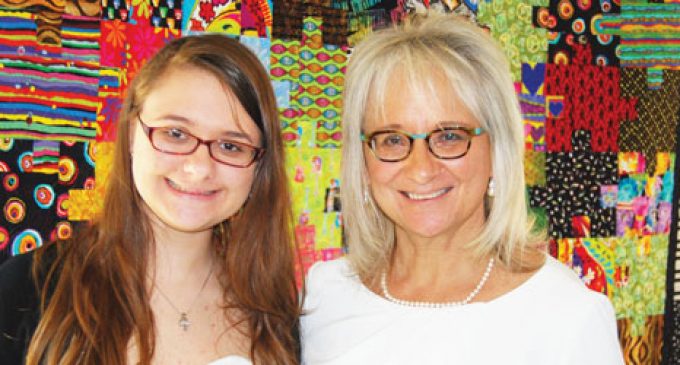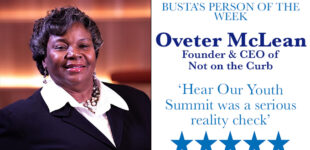The Power of ‘iCan’

Program helps ‘members’ come out of shells
(pictured above: iCan House Executive Director Kim Shufran with her daughter Erica Muller.)
The iCan House raised funds and awareness at St. Paul’s Episcopal Church on Thursday, March 20.
The iCan Do Lunch stressed the mission of the nonprofit, which helps local people who have social difficulties caused by mid-to-high functioning autism and various other disorders, though no diagnosis is required of clients, who are referred to as “members.”
At iCan House’s downtown Fourth Street headquarters, group and one-on-one sessions between members – who are both children and adults – and professionals trained to helped them leap social hurdles.
iCan House Executive Director Kim Shufran founded the organization in 2008 to help her daughter Erica Muller, now 17, who was diagnosed with Asperger’s Syndrome, a high-functioning form of autism.
“People focused more on what she couldn’t do instead of what she could do, and that was really disturbing to me as a mom,” Shufran recalled. “I didn’t want her … to rise to something less than her capacity.”
iCan House helps 125 members a week, according to Program Director Allie Wilmot, who says the focus is always on members’ strengths, not their weaknesses.
Most iCan House programs have rolling enrollment, allowing members to start and stop at any time. Many members utilize iCan’s services for years.
[pullquote]“There really is no other service for this population. This population is generally overlooked. They’re oftentimes very smart, so they can’t necessarily get the services that they need at school until they fail a class.”[/pullquote]
Each member sets goals for his or her life and social skills development, whether that’s living independently, making friends, getting a job or all three.
“Generally, they have a really hard time making friends and they need some assistance doing that, and so they generally don’t fit in,” Wilmot said. “So generally they have low self esteem as a result. They have a hard time getting jobs later; eighty percent of them are underemployed or not employed.”
Half of iCan’s funding comes from the fees it charges for services; the rest is from donations. The luncheon was packed with potential donors, who came face-to-face with many iCan members and their families.
Anna and Mark Fisher send their daughter Alana, 13, to iCan House. They adopted Alana when she was two from a Russian orphanage and say the child’s experiences there resulted in some lingering social difficulties. Anna Fisher liked that iCan House doesn’t require members to be medically diagnosed, since the couple didn’t want their daughter being labeled.
Four years ago, Alana started out in the iClub, where members of the same age gather weekly to practice social skills with the guidance of an iCan staff member. Now, she takes part in one-on-one sessions with Wilmot.
“Alana feels at home in the iCan House,” Anna Fisher said. “She feels that she belongs.”
iCan House member Teddy Caddy, 35, has a high functioning form of autism. He was diagnosed two years ago after his family lost all of their possessions in a fire. Such change and transition can trigger autism symptoms. He’s attended group sessions with other adults at the iCan House for a year and says it’s really helped him.
“You’re going to live with autism whether you’re diagnosed or whether you try to deny it; it’s there,” said Caddy, who works in the information technology industry. “It’s nice to actually do things like come to these meetings and interact with other people and talk about issues like anxiety and things on the job, you know, just things that come up.”
During the luncheon, which was emceed by WFDD’s David Ford, a/perture Cinema owner Lawren Desai talked about hiring one of iCan’s members. With the help of the iCan House staff, the employee has become a valued member of the cinema’s team, Desai said.
Best-selling author John Elder Robison, who’s written a series of books on his life with Asperger’s, gave the keynote address. During a long and varied career, he’s done everything from building guitars for rockers Kiss to helping to create the first video games and talking toys for Milton Bradley. He now runs Robison Service, a speciality automobile company in Springfield, Mass. where he teaches auto-repair to at-risk youth.
Robison said that autism has always been around but is only now being diagnosed because of the changing world. He said that centuries ago, when people knew everyone around them and learned through hands-on master/apprentice relations, people like him, who learn from doing and thrive in structured environments, easily blended in. But modern society, with its requirement for constant interaction between strangers and abstract forms of learning, have caused people with autism to stand out, he said. The communication challenges they face, such as being unable to read the emotions of others, can land them in trouble at school or even cost them an employment opportunity.
He compared putting someone in a program because they’re autistic to sending African Americans to black schools during segregation and praised iCan House for working to help its members co-exist and thrive.
Robison, who sits on the Interagency Autism Coordinator review board for the National Institute of Health Centers for Disease Control, said more effective counseling therapies are being researched and developed that will make the work of organizations like iCan House even more effective.
“It’s going to take a population of people who were disabled because of modern society … (and) allow them to go out into society and shape it today and offer it the same type of gifts and contributions that their autistic ancestors for hundreds and hundreds of years were able to bring to the world, and that’s a really big deal,” he said.
For more information about iCan House, including the partial scholarships it offers, visit www.icanhouse.org or call 336-723-0050.



















